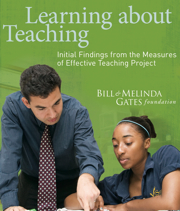Jan. 23, 2012
We have a small task for you to perform in the name of school reform.
Below this article is a set of statements titled “Student Survey.”
Imagine yourself back in high school. Pick one of your teachers. Read the statements and think about how you would have answered each one about each teacher. You don’t have to keep score; that’s not the point.
The point is this: Today, now that you are somewhat removed from the age you were when you were in high school, do you think that the answers you would have provided if you had been given this survey in high school would have been fair to the teacher? Do you think your answers would, when combined with other students’ answers, have identified the best teachers, the teachers who needed coaching, the teachers who should not have been in the classroom?
This survey was included in a recent report from the Measures for Effective Teaching (MET) Project, which is funded by the Bill and Melinda Gates Foundation. The report (click the picture below to download the report) used the survey in more than 2,500 classrooms. There were safeguards in place to reassure students that their teachers could not trace their answers back to them.
If we understand the MET report, the investigators found that the students’ perceptions of quality teaching matched up rather well with the so-called “value added” testing results that aim to quantify if a teacher’s students are learning a year’s worth of material in a year’s time.
The MET report’s suggestion is that student surveys be a part of the body of information used in assessing teacher quality. The authors say that the more information that goes into such assessments, the better.
The report’s endorsement of student surveys – and particularly its conclusion that student survey results nearly mirror the results of all the testing behind “value-added” rubrics – might lead a few test-weary parents and students to ask a different question:
Could student surveys yield the same fundamental data about teacher competence that these batteries of pre-tests and post-tests yield?
Could we do a pilot program, with students using the survey instrument not just once a year but perhaps quarterly, and see what happens, and at what cost compared to the costs of the testing programs?
Just a thought.
If you have thoughts after taking the survey and would be willing to share on these pages your thoughts and your name with the public, there is a place below the survey to click.
– Steve Johnston
Student Survey
CARE
● I like the way my teacher treats me when I need help.
● My teacher is nice to me when I ask questions.
● My teacher in this class makes me feel that he/she really cares about me.
● If I am sad or angry, my teacher helps me feel better.
● The teacher in this class encourages me to do my best.
● My teacher seems to know if something is bothering me.
● My teacher gives us time to explain our ideas.
CONTROL
● My classmates behave the way my teacher wants them to.
● Our class stays busy and does not waste time.
● Students behave so badly in this class that it slows down our learning.
● Everybody knows what they should be doing and learning in this class.

Front cover from Measures for Effective Training student perceptions survey
CLARIFY
● My teacher explains things in very orderly ways.
● In this class, we learn to correct our mistakes.
● My teacher explains difficult things clearly.
● My teacher has several good ways to explain each topic that we cover in this class.
● I understand what I am supposed to be learning in this class.
● My teacher knows when the class understands, and when we do not.
● This class is neat – everything has a place and things are easy to find.
● If you don’t understand something, my teacher explains it another way.
CHALLENGE
● My teacher pushes us to think hard about things we read.
● My teacher pushes everybody to work hard.
● In this class we have to think hard about the writing we do.
● In this class, my teacher accepts nothing less than our full effort.
CAPTIVATE
● School work is interesting.
● We have interesting homework.
● Homework helps me learn.
● School work is not very enjoyable. (Do you agree?)
CONFER
● When he/she is teaching us, my teacher asks us whether we understand.
● My teacher asks questions to be sure we are following along when he/she is teaching.
● My teacher checks to make sure we understand what he/she is teaching us.
● My teacher tells us what we are learning and why.
● My teacher wants us to share our thoughts.
● Students speak up and share their ideas about class work.
● My teacher wants me to explain my answers –why I think what I think.
CONSOLIDATE
● My teacher takes the time to summarize what we learn each day.
● When my teacher marks my work, he/she writes on my papers to help me understand.
– From the Measures for Effective Training student perceptions survey, based on the work of the Tripod Project for School Improvement and included in the research paper, “Learning about Teaching: Initial Findings from the Measures of Effective Teaching Project,” published January 2012 by the Bill & Melinda Gates Foundation. Download the report here.
